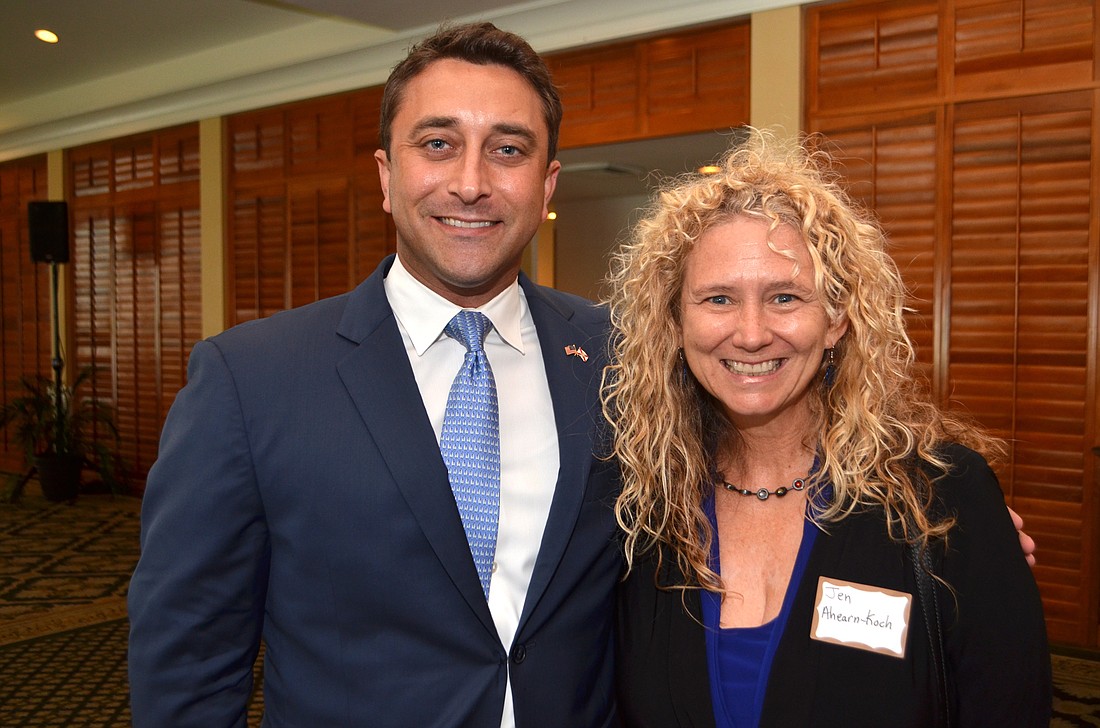- July 15, 2025
-
-
Loading

Loading

Four months after his appointment as mayor by his fellow city commissioners, Hagen Brody is pleased with the changes he’s helped bring to the board’s meetings, including more rigorous time limits for presentations and Q&As.
“I think the general consensus is the meetings are moving along in a fashion that’s productive and efficient and allows for the most public participation,” Brody said.
Although Brody said he’s heard positive feedback, there’s at least one vocal critic: Commissioner Jen Ahearn-Koch. Since late 2020, Ahearn-Koch has expressed concerns about having a limited amount of time to ask questions during public hearings.
She’s run through her time on a few occasions, and on others, Ahearn-Koch said, she’s felt like she’s had to rush to avoid hitting a 15- or 20-minute limit. At the March 16 meeting, Ahearn-Koch said she wanted to schedule a discussion about the meeting structure and objected to Brody placing time limits on the commission.
“I don’t feel I’m able to do my job to the best of my ability,” Ahearn-Koch said.
In January, during a public hearing on proposed renovations to Marie Selby Botanical Gardens, Ahearn-Koch fought Brody’s efforts to implement a 20-minute time limit for commissioner questions. Brody initially rejected Ahearn-Koch’s efforts, but Ahearn-Koch eventually persuaded City Attorney Bob Fournier to affirm that the board as a collective has the ability to establish its rules and procedures, not the mayor alone. Although Commissioner Liz Alpert sided with Ahearn-Koch, the majority of the commission upheld the time limits in a 3-2 vote.
Brody said he does not unilaterally come up with the time limits, stating that city administration and the city attorney’s office lead the process based on public interest in a given topic and their expectations on how long it will take to cover an agenda item. He also noted the time limits don’t just apply to commissioners but to all aspects of commission meetings, including public comment and presentations from applicants and city staff.
Brody has said his goal is to make commission meetings less time-consuming and more predictable. He believes the public is more likely to engage if given a sense of when the commission is going to discuss topics that interest them, and he thinks time limits are a tool to get to that point.
“I’m tasked with running an efficient meeting, so the public can participate fully,” Brody said. “Hopefully, the days are gone where we had long, drawn-out meetings.”
Ahearn-Koch said she understands the goal but felt the nature of public hearings — which can include hours of input from residents — makes it difficult to adhere to strict guidelines. She said that’s particularly true for quasi-judicial public hearings, in which the board is supposed to reach decisions based on evidence presented.
“These meetings are not a barber’s appointment,” Ahearn-Koch said. “You can’t show up at 5 and expect to leave by 5:20. These are public hearings, and they’re really important.”
No commissioner has openly struggled with the time limits as much as Ahearn-Koch. She said she’s not sure why that is, though she speculated it could be because she is typically the first to ask questions. She suggested the commission could emulate the procedures of the Planning Board, which allows each member to ask three questions at a time, cycling through until each member is done.
Although Brody said he believed the time limits would lead to improved public participation, Ahearn-Koch said she sees them as an impediment. Ahearn-Koch said she uses the time allotted to her to seek answers to questions residents have raised. Without that, she fears her constituents will lose faith in their ability to have their voices represented.
“Everybody has a voice — you have a voice, you have a vote,” Ahearn-Koch said. “I think when people don’t get to express that is when you have the frustration that is destructive.”
Brody said he’s open to input from the rest of the commission on opportunities to improve the board’s procedures, though he hopes to avoid regular debates on the topic.
“I don’t want the discussion on the time to become time-consuming in the meetings, but I want commissioners to feel comfortable with the times,” he said.
Ahearn-Koch said she would accept the decision and attempt to work within the constraints the board adopts if changes are made as a group.
“That is why we are a collective body,” she said. “We are a commission. We — five people — decide the process. If that’s the prevailing decision, then I must adapt to this; I must adjust to it. But we can have the conversation first.”